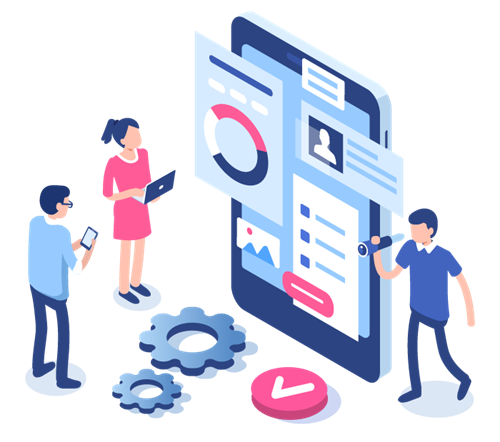Featured
Everything You Need to Know About Call Center Training
by Kent Mao | Published On March 13, 2024 | Last Updated April 4, 2024

Building an effective training program is an essential part of managing a call center.
As call centers evolve, agents are under significant pressure to deliver convenient, fast, knowledgeable, and empathetic service to customers.
At the same time, they need to be able to adapt to changing technology — such as the rise of AI and automation tools — while constantly searching for ways to boost productivity and efficiency.
Call center training is the key to empowering your agents with the knowledge and skills they need to survive and thrive in today’s customer service landscape.
In this guide, we’ll cover what call center training is, the skills companies need to focus on, and the best methods and tools for call center training.
What is Call Center Training?
Call center training is the process of preparing individuals within your organization to excel in various customer service-focused workflows. It’s how you ensure your employees can reach their full potential and deliver exceptional customer experiences.
In today’s world, training goes beyond simply delivering educational resources to new agents during the initial onboarding process.
For most companies, training is an ongoing strategy that covers everything from introducing agents to new software tools to ensuring they can improve critical hard and soft skills over time.
What are the Benefits of Call Center Training?
The main benefit of call center training is that it improves your chances of getting the best performance from your agents.
The right training strategy helps boost efficiency and productivity, ensuring agents can rapidly and accurately address customer requests, properly utilize call center tools, and represent your brand appropriately.
An effective training strategy can also:
- Help attract and retain top talent: Today’s agents are looking for opportunities for professional development. Did you know that 69% of employees say they're more likely to stay with a company if they receive great training? That is why implementing a good training program can help attract more talent to your team.
- Increase profit margins: Training initiatives can help make your agents more efficient in their roles, which can reduce overhead costs and minimize costly mistakes. They can also help agents become more effective at converting and retaining customers.
- Improve customer experience: Well-trained agents deliver more convenient, personalized, and intuitive customer experiences. The better the customer experience you deliver, the more you differentiate your company from other market leaders.
Call Center Training Methods and Programs

There are many ways to approach training in call centers. Some companies use traditional, classroom-based sessions to teach new agents how to do things like handle a call or respond to a complaint. Other companies train their agents using gamification, role-playing exercises, and online e-learning modules.
Here are the most common methods for call center training:
Classroom training
Traditional, classroom-based learning can be an effective option for teaching new in-office agents how to use call center technology. It can also help to facilitate bonds between groups of agents and pave the way for successful collaboration.
Role-playing exercises
Role playing is excellent for teaching agents how to handle complex scenarios in the call center, such as responding to a complaint or helping a customer choose the right product to purchase. Try pairing your trainees with more experienced agents and let the experienced agents roleplay as different customers.
Online e-learning modules
E-learning modules provide a flexible and cost-effective way for call centers to train their staff. They're interactive, which means employees can engage with the material more deeply through quizzes and simulations. This approach not only makes learning more interesting but also allows for immediate feedback, helping employees understand where they need to improve right away. Many e-learning platforms allow call center managers to create their own training modules too.
On-the-job training
Training on the job in the call center may include using a buddy system to give new agents guidance as they settle into their new role, leveraging gamification tools, or providing real-time coaching during customer interactions. Supervisors can use call center monitoring features such as agent whisper to talk directly to the agent and provide live feedback without the caller being able to hear.
How to Implement a Call Center Training Program
While there’s no one-size-fits-all method for call center training, the process you use to implement your training should include a few key steps.
Step 1: Assess your training needs
The first step in deploying an effective training strategy is evaluating your call center to identify gaps in skills, knowledge, and abilities. There are many ways to gain insights into the type of training your employees need. For example, you can:
- Analyze metrics: Leverage performance reporting tools to determine where agents might be struggling with things like handling requests quickly (average handling time) or preserving customer loyalty (customer satisfaction scores).
- Review customer feedback: Assess the feedback received from your customers through post-call surveys and look for training opportunities there. Alternatively, ask your team members for internal feedback on coworkers to identify what skills they think they should improve.
Step 2: Design a comprehensive training curriculum
Based on the knowledge and skills gaps you’ve identified in your call center, decide how you’re going to deliver training to your agents. Choose what kind of training method you’re going to use, such as classroom-based or e-learning modules, and leverage tools to curate training resources.
For instance, learning management systems can integrate with your existing business databases and tools, allowing you to create comprehensive classes covering everything from how to use call center software to how to address a range of customer issues.
Remember to think about how you’ll track the progress of your employees through different training modules and evaluate their development, such as with assessments or quizzes.
Step 3: Incorporate engaging training materials
Studies show that 28% of call center agents take as long as 5 - 6 weeks to complete training initiatives. In some cases, companies even struggle to convince agents to commit to training in the first place.
The best way to improve your chances of training adoption and success is to ensure the learning experience is engaging and interactive.
One way to improve engagement is to utilize gamification methods. For example, you can let agents track their training progress through e-learning modules and compare their performance to colleagues via leaderboards.
Reward agents with badges or certificates when they complete specific training sessions and offer performance-based incentives.
Step 4: Set clear learning goals and objectives
Clear and measurable goals are crucial to any training strategy. They help to ensure your employees understand what they’re trying to accomplish before they begin the learning process. They also provide clarity on how you’ll evaluate their progress.
The goals you set for training will vary depending on the knowledge gaps you’ve identified in your team, as well as your overall business goals.
For example, you might decide to implement training initiatives that help agents build stronger relationships with customers to increase retention rates and reduce churn. Alternatively, your goal could be to train agents to be more efficient and productive in their role, reducing average handling times and improving service delivery.
Remember to make sure your goals are specific, measurable, realistic, and time-bound.
Best Software Solutions for Call Center Training

Running an efficient call center requires training solutions that are not just effective but also engaging and scalable. Here's a curated list of five software solutions that can help boost your approach to call center training.
Seismic
Seismic offers a suite of training and sales enablement products which include easy-to-use lesson creation tools. This allows call center managers to develop custom training modules. Seismic's strength lies in its simplicity and focus on practical training scenarios that can be directly applied to real-world interactions. Interactive quizzes and feedback mechanisms help ensure the retention of knowledge and skills.
Key Features:
- Blended learning and instructor-led training
- Practice scenarios and role plays
- Automated coaching
- Skills assessments
- Analytics and insights
Ideal For: Call centers that prioritize hands-on, scenario-based training and seek a user-friendly platform for creating custom learning experiences.
CallMiner
Specializing in conversation analytics, CallMiner offers a data-driven approach to call center training. By analyzing actual customer interactions, this software provides insights into communication patterns, customer sentiment, and compliance issues. This allows for targeted training that addresses specific areas for improvement, making it a powerful tool for enhancing communication skills and customer satisfaction.
Key Features:
- Dashboards
- Coaching workflows
- Manual and automated evaluations
- Call finder and viewer
- Compliance and script adherence monitoring
Ideal For: Data-driven call centers aiming to improve communication skills and customer satisfaction through analyzing actual customer interactions.
Playvox
Offering a suite of workforce engagement management tools, Playvox focuses on quality assurance, performance management, and agent motivation. Its training module integrates seamlessly with its quality monitoring system, allowing for the identification of training needs based on agent performance. Gamification and recognition features also help in keeping agents motivated and engaged in their learning journey.
Key Features:
- Customized learning paths
- Multimedia courses, including video
- Comprehension checks
- Automated coaching recommendations
- Coaching stats dashboard
Ideal For: Call centers that want a comprehensive workforce management and quality management solution with built-in training features.
Udemy Business
Udemy Business is an online learning platform with a vast library of courses covering different topics, including customer service and communication skills. Udemy Business is great for call centers looking to offer their employees access to a wide range of learning materials. The platform allows managers to curate collections of courses tailored to their team's needs and track progress through a centralized dashboard.
Key Features:
- On-demand learning
- Actionable analytics and insights
- Intuitive user interface
- Custom learning paths
- Seamless integration
Ideal For: Call centers that value flexibility and a large library of pre-built training content.
EdApp
EdApp is a mobile-first microlearning platform designed to provide an engaging way for teams to learn and develop new skills. It stands out for its innovative approach to corporate training, emphasizing bite-sized learning modules that fit into the busy schedules of employees. It has an extensive library of training materials for call centers with an emphasis on customer service.
Key Features:
- Ready-made training courses
- Custom course builder
- Mobile learner portal
- AI-enhanced course creation
- Real-time analytics
Ideal For: Call centers that prioritize flexible, engaging, and effective learning solutions that can be accessed on any device.
Tips and Best Practices for Call Center Training
Have you been tasked with training new agents and don’t know where to start? Here’s a list of ideas to help jumpstart your training program.
- Begin with team introductions: Start new agent training by introducing them to the entire call center staff. Make sure to include both leaders and frontline employees. This helps foster a sense of community and provides new agents with valuable contacts for support.
- Educate new hires on your company: Ensure new agents fully grasp and understand your business operations, culture, and values. This will help them to represent your company effectively and align their actions with your business goals.
- Leverage top performers for training: Ask top-performing employees to share their knowledge and help train new agents. Engaging top agents in the training process allows new hires to observe and adopt best practices, ultimately improving customer satisfaction and agent performance.
- Implement a buddy system: Establishing a buddy system pairs new agents with seasoned employees to facilitate on-the-job learning and mentorship. Through silent call monitoring and listening to recorded calls, new agents can observe firsthand how experienced agents handle customer interactions and utilize tools effectively.
- Teach best practices for call handling: Provide comprehensive training on call handling techniques through examples and role-play exercises. Familiarizing agents with different scenarios helps them to handle customer interactions effectively.
- Empower agents with software training: In-depth training on how to use call center software is essential for enhancing agent productivity and efficiency. Agents should undergo training to fully familiarize themselves with software features such as call handling, transfers, and escalation procedures.
- Offer incentives: Implementing incentives is an effective strategy to boost motivation and engagement among new agents. Incentives can range from recognition programs such as a "kudos" system to reward outstanding performance, to individual or team-based performance targets with tangible rewards. By offering recognition and high-value incentives, you can motivate call center agents to excel at their new jobs.
Essential Skills for Call Center Agents

When training new agents, it's important to focus on a few key skills that are necessary for success. This will help optimize your training processes and maximize your return on investment for any training tools you employ.
Communication
Call center agents need to be excellent at communicating with both customers and their coworkers. They need to excel at not just verbal communication when speaking over the phone, but also written communication when writing emails and live chat messages.
The communication skills required by a call center agent go beyond simply being able to explain information clearly. They also need to demonstrate empathy and compassion. For example, agents need to have good active listening skills to build relationships with customers.
Agents also need to be able to de-escalate angry or frustrated customers by using kindness and a soft approach.
Technical skills
The digital transformation of call centers has made technical skills increasingly essential for agents. Today’s professionals need to be comfortable using different call center software tools, from cloud-based communication platforms to CRM databases.
Agents who take on supervisory roles may also need to be adept at using workflow automation software, AI-powered assistants, digital knowledgebases, and reporting or analytical tools.
Problem-solving
Call center agents are dedicated problem solvers. They need to be able to address the concerns of customers quickly and effectively, regardless of whether they need help choosing a new product or troubleshooting a technical issue.
Agents should be able to leverage the knowledge they have of your company and products, as well as use creativity to address all kinds of problems. In some cases, solving problems could also involve collaborating with coworkers and subject matter experts.
Time management and multitasking
Call centers are fast-paced environments. The more efficient an agent is at managing their time — including multi-tasking and prioritizing — the more valuable they’ll be.
Agents with good time management skills know how to utilize the time they have to serve customers as effectively as possible, and to deliver fast results without compromising on soft skills such as empathy.
Not only does excellent time management ensure that an agent can field more calls, but it improves the customer experience as well. Customers prefer competent agents who can address their issues quickly and efficiently without wasting time.
Common Challenges of Call Center Training
Effective training is crucial to building a call center that drives high levels of customer satisfaction and supports business growth. However, there are various challenges that you’ll need to consider.
High turnover rates and retention issues
Call centers are often plagued by high employee turnover rates. Implementing more engaging training initiatives, responding to feedback from employees, and addressing issues with employee burnout can help to eliminate this problem. By keeping existing employees happy and loyal to your company, you can reduce the time and resources needed to train and onboard new staff members.
Adapting to new technology and shifting customer expectations
The call center landscape is constantly changing due to evolving consumer expectations and technological advancements. This means companies need to ensure they’re taking a proactive and dynamic approach to training initiatives. In order to stay ahead of the curve, it’s important to regularly review skill and knowledge gaps within your team and update your training program accordingly.
Managing diverse learning styles and skill levels
Call center employees learn and improve their skills in different ways. Some agents will respond best to hands-on and experiential training strategies like role playing. Others will prefer having the opportunity to access a wide range of training resources online during their own time. Ensure you consider the different preferences of your agents when building your training program.
Summary
Call center training helps equip new agents with the necessary knowledge and tools to effectively handle customer interactions. This type of training covers a range of topics including software proficiency, understanding business objectives, communication etiquette, and problem-solving skills.
Through a mix of live sessions, e-learning modules, and roleplaying exercises, agents can learn to handle complex customer issues and use call center software efficiently.
Ultimately, a successful call center training program will help improve customer loyalty, increase customer engagement, and optimize efficiencies within your business.
To learn more about call center training, read our blog post on the Top 10 Training Methods to Increase Agent Productivity and Customer Experience.
More from our blog
 Data silos are a well known issue in the contact center world, but new software solutions can help.
Data silos are a well known issue in the contact center world, but new software solutions can help.
 If you’ve managed (or worked in) a call center, you’ve probably had days that felt chaotic. Maybe it’s a payment outage or a sudden rush after a promotion. You start the morning thinking you can handle everything. Two hours later,...
If you’ve managed (or worked in) a call center, you’ve probably had days that felt chaotic. Maybe it’s a payment outage or a sudden rush after a promotion. You start the morning thinking you can handle everything. Two hours later,...
 Society today is in a unique position as a result of the current COVID-19 pandemic. Individuals and businesses everywhere are facing much uncertainty regarding the current circumstances, how long they will last, and what exactly the long-term impacts will be....
Society today is in a unique position as a result of the current COVID-19 pandemic. Individuals and businesses everywhere are facing much uncertainty regarding the current circumstances, how long they will last, and what exactly the long-term impacts will be....

